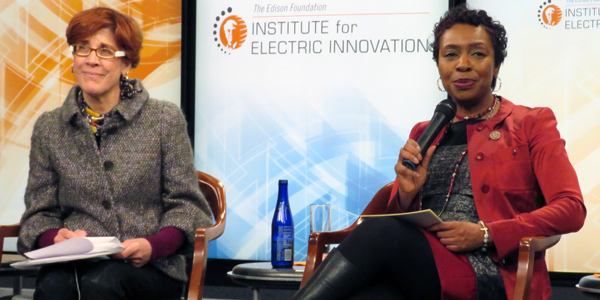WASHINGTON — The Institute for Electric Innovation’s spring 2018 forum Wednesday featured a discussion on corporate renewable energy procurement and an appearance by Rep. Yvette Clarke (D-N.Y.), co-chair of the newly formed Smart Cities Caucus. Here’s some of what we heard.
Electric Industry an ‘Afterthought’ to FCC?
Edison Electric Institute Executive Vice President and former FERC Commissioner Phil Moeller told Clarke that the electric industry feels like an afterthought in the Federal Communications Commission’s discussions on the rollout of 5G cellular technology.
“We have another issue [at the FCC] with pole attachments and spectrum allocation, but particularly with [the] 5G network, our infrastructure is going to play a big role,” Moeller said. “Safety has to come first. We could probably use your help at the Smart Cities Caucus to remind the FCC that our industry should not be an afterthought but should be at the table during some of these discussions.”
“I agree wholeheartedly,” responded Clarke. “We’ve had hearings already with that in mind. That’s going to be a challenge in every corner of the nation because we’re going to be expected to utilize the infrastructure that already exists. So there has to be a collaboration. In many towns, cities, municipalities, there’s going to be a struggle about how you site these things.”
Corporate Renewable Procurements, Green Tariffs Growing

Letha Tawney, director of utility innovation for the World Resources Institute, led a panel discussion on corporate renewable energy procurements, noting that green tariff programs in 15 states have helped to bring 1 GW of new solar and wind projects to the grid since 2013.
“There’s been some successes,” said Tawney, whose organization works with utilities and customers to craft green tariffs. “How do we scale this? This is still pretty marginal. We just passed a gigawatt of transactions being signed. That’s not that much, really, in the whole U.S. market. … We need to do a lot more.”
Robert M. Blue, CEO of Dominion Energy’s Power Delivery Group, worked with customers like Steve Chriss, director of energy and strategy analysis for Walmart, in developing a new renewable generation (RG) tariff that functions as a contract for differences.
“The renewable generation tariff that we filed, a lot of it wasn’t working for a lot of customers,” Blue said. “That’s why we revised it. We heard from them what would make it work better and we expect that that will have a substantial impact.”
Last October, Dominion announced Facebook will build its eighth U.S. data center in the utility’s territory outside Richmond, Va., under a proposed new Schedule RF (renewable facility) rate structure, with which the company will offset its 130-MW load with renewables. Facebook’s goal is to power all its operations with renewable energy.
Walmart, which takes service from 1,000 utilities, has a goal of being 50% renewable power by 2025.
“We operate in a lot of states that aren’t deregulated and a lot of states where there’s not necessarily a market in place,” said Chriss. “In SPP or MISO, you can do a virtual [power purchase agreement] … but in Southern Co. or in some of the other big IOUs, there is no market, per se. So really, the market is their system and so you have to figure out structures that work within that.”
Even within Southern’s utilities, rules differ across state lines, Chriss said. “Our deal with Alabama Power [a 72-MW solar farm in southeastern Alabama that went into operation several weeks ago] … is very different from the Georgia [Power] structure.”
Nick Wagner, a member of the Iowa Utilities Board, discussed concerns over corporate procurements resulting in cost shifts to other customers.
“It’s no secret to probably anybody in this room that utility costs have been so highly socialized for a long time. It will take us some time to unwind those as we have the data” from cost-of-service studies, he said. “It’s probably a little more masked in the vertically integrated [states] than in the non-vertically integrated [states]. As we get more data, I think it’s going to become a little bit easier to separate those things out.”
Wagner said regulators’ efforts are aided by interventions by customers and other interest groups. “If nobody’s happy at the end of the day, but no one is really angry, you probably came to about the right place,” he said. “If someone’s walking out high-fiving, we know we messed up somewhere.”
— Rich Heidorn Jr.








